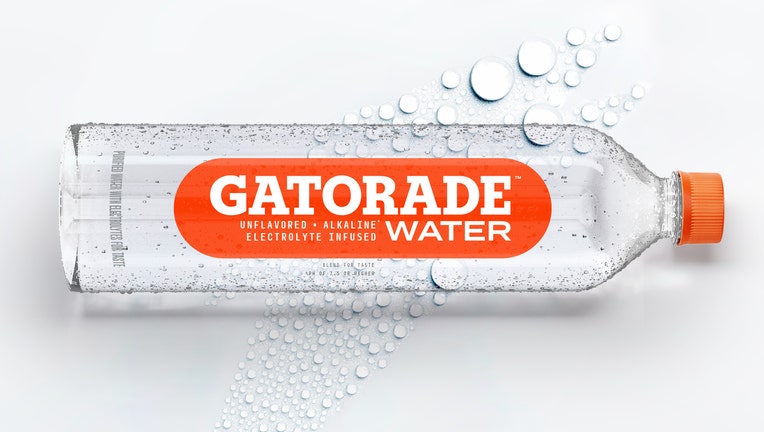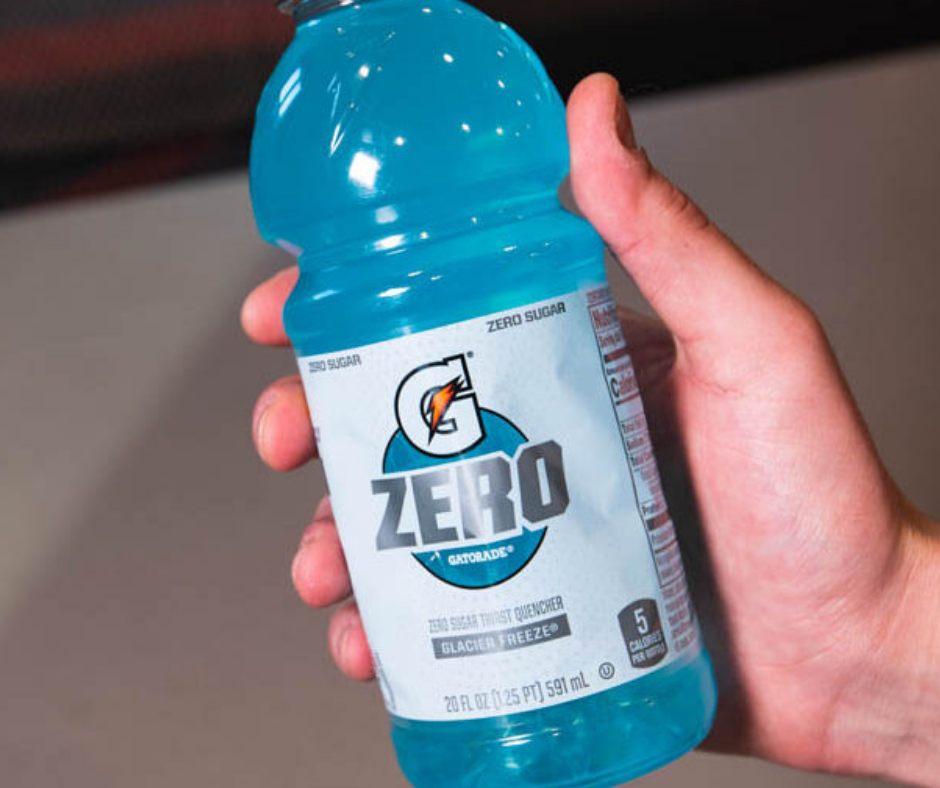Gatorade Zero contains minimal calories due to the presence of certain amino acids and electrolytes. These elements provide necessary hydration and replenish lost nutrients, marginally contributing to the total caloric content.
Gatorade Zero is designed for those seeking the hydration and electrolyte benefits of Gatorade without the sugar. It’s an appealing option for athletes and fitness enthusiasts aiming to maintain a low-calorie diet while still fueling their workouts and recovery. Despite being sugar-free, the beverage includes small amounts of calories to support its functional purpose.
The importance of a sports drink like Gatorade Zero lies in its ability to quickly deliver hydration and essential nutrients that are often depleted during vigorous exercise. It offers a balance by allowing replenishment without high sugar intake, which is appreciated by those monitoring their caloric consumption closely. Gatorade Zero’s formulation strategically aligns with the needs of a health-conscious market, focusing on minimal calorie impact while providing the key benefits of a sports hydration drink.

Credit: www.amazon.com
The Buzz Around Gatorade Zero
Gatorade Zero promises low calories while maintaining taste. Many sports enthusiasts and health-conscious individuals are drawn to this sugar-free beverage. Folks often think “zero” means no calories, but that’s not always true. Some confusion exists because Gatorade Zero does have a few calories.
The catch is in the branding. “Zero” does not always mean absolutely none. It often means significantly less than the usual amount. The calories in Gatorade Zero come from the small amounts of proteins and amino acids present. These are necessary for the drink to provide effective hydration and energy during workouts.
Caloric Content: The Basics
Gatorade Zero is known for its low-calorie content. Yet, it still has calories. Understanding the science behind this reveals why. Calories are units of energy. Our bodies need them to perform daily activities. Zero-calorie drinks generally have less than five calories. They are required to be labeled as having “zero” due to regulations.
Calories in beverages are measured through a process called calorimetry. This process burns the drink to see how much energy it gives off. Despite being marketed as “Zero,” Gatorade Zero still contains a small amount of energy. This comes from trace amounts of carbohydrates and sweeteners, which contribute a few calories.
Ingredients Of Gatorade Zero
Gatorade Zero is known for its low-calorie content. Surprisingly, it still contains some calories. A primary reason is the presence of artificial sweeteners. These sweeteners provide a sweet taste without the high-calorie cost of sugar. Yet, they hold a minimal calorie value, which adds to the total calorie count.
The ingredient list of Gatorade Zero often features sweeteners like sucralose and acesulfame potassium. Despite being low in calories, these compounds contribute slightly to the overall energy content. Concerns regarding artificial sweeteners usually revolve around their safety and effect on health. Rest assured, food authorities have deemed them safe for consumption within set limits.
Nutritional Labels And FDA Regulations
The term ‘Zero’ in food labels might be tricky. FDA regulations allow this term even if products have a few calories. A product labeled with ‘Zero’ does not mean it’s free of all contents. It often means the product has less than 5 calories per serving. For Gatorade Zero, this rule applies as well. This sports drink has less than 5 calories, which fits the guidelines. So, it still says ‘Zero’ on the label.
The FDA sets specific rules for what ‘Zero’ means. These rules help us understand food labels better. The table below shows the FDA’s rules for calorie claims:
| Term | Meaning |
|---|---|
| Calorie Free | Less than 5 calories per serving |
| Low Calorie | 40 or fewer calories per serving |
| Reduced Calorie | At least 25% fewer calories than original |
Knowing these rules helps us make better food choices. Gatorade Zero’s few calories come from ingredients that offer electrolytes and taste without much energy.
The Science Of Metabolism And Energy
Gatorade Zero is known for being a low-calorie sports drink. It’s designed to hydrate without a high sugar content. The calories found in Gatorade Zero come from the small amount of digestible material used to add flavor and stability to the drink.
Zero-calorie sweeteners, such as those in Gatorade Zero, can have a confusing effect on our bodies. Our metabolism doesn’t treat these sweeteners like traditional sugar. The body may expect calories after tasting something sweet.
This expectation could trigger metabolic responses anticipating energy that is not provided by the drink. Consuming zero-calorie sweeteners might affect our daily caloric intake. They do not offer nutritional energy, so they should not count towards daily energy needs.
Comparing Gatorade Zero With Other Beverages
Gatorade Zero’s calorie count can seem confusing since it is marketed as a no-sugar beverage. It differs from traditional sweetened drinks, which typically contain high sugar levels. Calories in Gatorade Zero originate from the minimal amounts needed to enhance flavor and retain the sports drink qualities.
Other brand comparisons show varying results. Many zero-calorie drinks are available, but few can match Gatorade Zero’s electrolyte replacement. Brands like Powerade Zero also offer similar benefits but with different nutrient profiles.
| Brand | Caloric Content | Main Sweetener |
|---|---|---|
| Gatorade Zero | Very Low | Artificial Sweeteners |
| Powerade Zero | Zero | Artificial Sweeteners |
| Traditional Gatorade | High | Sugar |
Misconceptions About ‘zero-calorie’ Drinks
The term ‘zero-calorie’ often leads to confusion. It suggests that a product contains no calories at all. Yet, Gatorade Zero does have some calories. Federal guidelines allow drinks with less than 5 calories per serving to be labeled as ‘calorie-free‘. Gatorade Zero falls into this category. Minimal calories come from trace nutrients that are not calorie-free.
Marketing ‘zero’ products plays a big role in buyer choices. It creates a belief that these drinks aid in losing weight. This psychological effect can mislead customers. They often ignore the nutritional facts on labels. Always check the label to understand what you’re drinking. Know that ‘zero‘ doesn’t mean a complete absence of calories.

Credit: www.fox35orlando.com
Consumers’ Quest For Healthy Options
Many people choose drinks that help them stay healthy. Gatorade Zero is popular among these options. It has flavors that people love but with fewer calories. This drink fits into a health-conscious lifestyle because it offers hydration without extra sugar.
The calories in Gatorade Zero come from necessary ingredients that help in sports recovery. It has electrolytes and vitamins that are good for after exercise. Active individuals pick this drink to get those benefits. So, while it has calories, they are there for a good reason.
The beverage ensures that people get energy for their activities. Everyone, from athletes to casual gym-goers, can enjoy it. It is a smart choice for staying hydrated without unwanted sugar. People can keep up with their health goals and still enjoy a tasty drink.
The Bottom Line On Caloric Claims
Gatorade Zero is known for being a low-calorie sports drink. It’s designed to provide hydration and electrolytes without high sugars. The term “zero calories” isn’t entirely accurate as the beverage contains a small amount of calories. This is due to the presence of amino acids and flavorings that contribute minor caloric value.
Consumers should always read labels to understand true nutritional content. Not all “zero” products are completely free of calories. It’s vital to consider your dietary needs and goals when choosing drinks. Staying informed helps maintain a balanced diet.

Credit: www.capecrystalbrands.com
Frequently Asked Questions For Why Does Gatorade Zero Have Calories
Does Gatorade Zero Contain Any Calories?
Yes, Gatorade Zero contains minimal calories. A single bottle typically has around 5 to 10 calories. These are necessary for the preservation and flavoring of the drink.
What Is The Source Of Calories In Gatorade Zero?
The source of calories in Gatorade Zero comes from the small amount of food additives and flavorings used to maintain its palatable taste despite being a no-sugar beverage.
Why Isn’t Gatorade Zero Completely Calorie-free?
Gatorade Zero isn’t completely calorie-free due to the inclusion of flavors and electrolytes. These ingredients slightly contribute to the overall calorie content while enabling hydration and taste.
How Does Gatorade Zero’s Calorie Count Compare To Regular Gatorade?
Gatorade Zero has significantly fewer calories when compared to regular Gatorade. Regular Gatorade can contain over 100 calories per bottle, while Gatorade Zero is designed to be a low-calorie alternative.
Conclusion
Wrapping up, the calorie content in Gatorade Zero stems from minimal sugars and flavorings. It’s crafted to fuel workouts without high sugar levels. For those tracking intake, it offers a viable alternative. Remember, zero calories doesn’t always mean zero impact on your fitness goals.
Choose wisely for your health journey.
